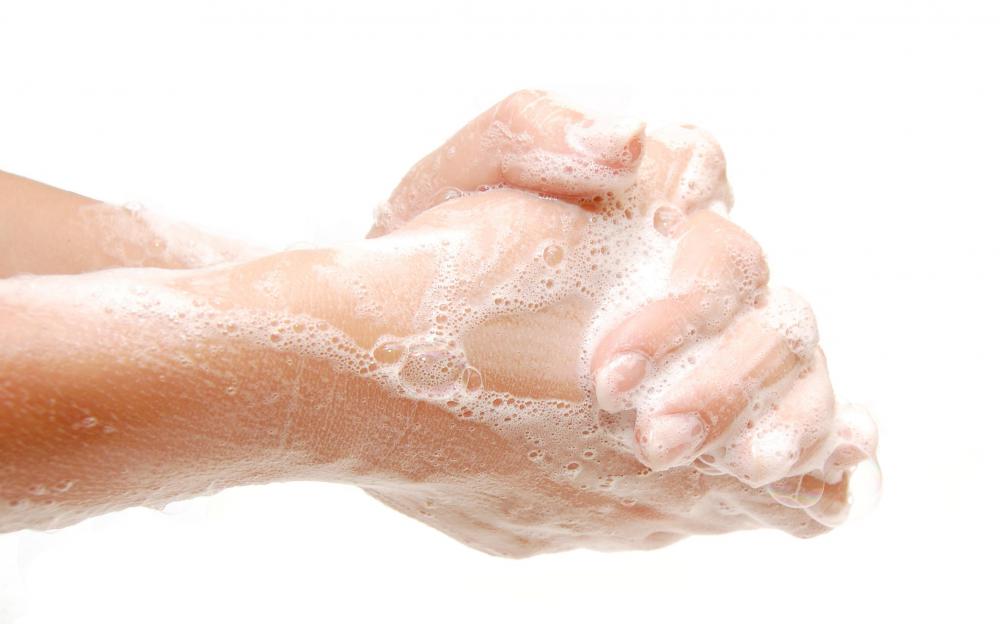At WiseGEEK, we're committed to delivering accurate, trustworthy information. Our expert-authored content is rigorously fact-checked and sourced from credible authorities. Discover how we uphold the highest standards in providing you with reliable knowledge.
How Do I Choose the Best Antibacterial Soap?
Choose an antibacterial soap that is appropriate for your skin type. If your skin is dry, you should select one with moisturizers. You may also choose natural or organic antibacterial soap if you have sensitive skin. Foaming soap is considered to be more sanitary than using bar soap, especially if the soap is used by more than one person.
Many types of antibacterial soaps are available for various needs. If you have acne-prone skin, you might want to try a medicated soap. This type of soap is designed to cleanse the skin and remove dirt that can clog the pores, preventing future acne break-outs. The antibacterial properties destroy surface germs that can lead to blackheads, whiteheads, and pimples.

If you prefer antibacterial soaps for bathing, consider buying medicated body wash. Look for ingredients that condition the skin, as this prevents roughness and dry patches from occurring. You may choose a scented soap or one that is unscented if you prefer. Choose a soap that is free of perfumes if you tend to have allergies or you are sensitive to harsh ingredients.

Some antibacterial soaps are made with all-natural ingredients, such as honey. Honey has natural antibacterial properties, and because it is a natural substance, it is considered safe to use. An organic soap containing honey and aloe may help ward off germs. Aloe can help condition the skin, as well as soothe irritated, itchy skin and rashes.
Other natural ingredients can be found in organic hand soaps, most of which have the ability to kill germs. Look for ingredients such as hemp oil, olive oil, and jojoba oil. These oils will moisturize and condition dry or irritated skin. If you have natural aloe at home, you can also add a few drops to your liquid hand soap for extra skin protection.

Remember to choose antibacterial soaps and cleansers that are pH balanced. The proper balance of alkaline in your antibacterial soap will cleanse your skin without over-drying. This will keep your skin looking and feeling healthy as it cleanses away the grime and germs.
A natural alternative to purchasing a store-bought antibacterial soap is to make your own homemade variety. Homemade soaps made with natural ingredients are generally environmentally safe and may be a better choice for your health as well. You can add a fresh scent to your liquid hand soap by adding some fragrant oils. For the purest soap, use only filtered or distilled water. If you want germ-fighting protection, try adding tea tree or coconut oil to your homemade mix.
AS FEATURED ON:
AS FEATURED ON:
















Discussion Comments
I also used antibacterial soap. These soaps contain natural essential oils that are known to have very powerful antibacterial properties.
Antibacterial body shower soap is good for acne and this home made soap. I read your post I like this section adding tea tree or coconut oil to your homemade mix because I used tea tree oil for the last five years.
@jennythelib - I'm glad you brought up triclosan, because you do still see it in a lot of antibacterial hand soaps. I think more and more people are starting to be aware of it, though. The FDA is currently reviewing its safety, at the FDA's notorious glacial pace, and it might actually be taken off the market.
Interestingly, triclosan soap has never been shown in studies to have any benefit over regular soap. The only thing triclosan has been shown to really do is prevent gingivitis, as a toothpaste additive (presumably because it helps kill germs).
I agree that the article has some good nontoxic suggestions, and the emphasis on staying moisturized is important. Skin that is moisturized and smooth is more resistant to germs than dry, cracked skin.
Ask yourself whether you really need antibacterial soap vs. regular soap. For most people, there is no need to use special antibacterial soap. Washing your hands regular with plain old soap will remove germs. Liquid soap is best, as a bar of soap that stays moist can sometimes be a breeding ground for germs.
The article has some good suggestions for natural products that have some antibacterial properties, but most commercial antibacterial soaps contain triclosan. (So do some acne face washes.) This is a highly toxic chemical that has been associated with antibiotic resistance and water pollution that is harmful to algae.
Post your comments